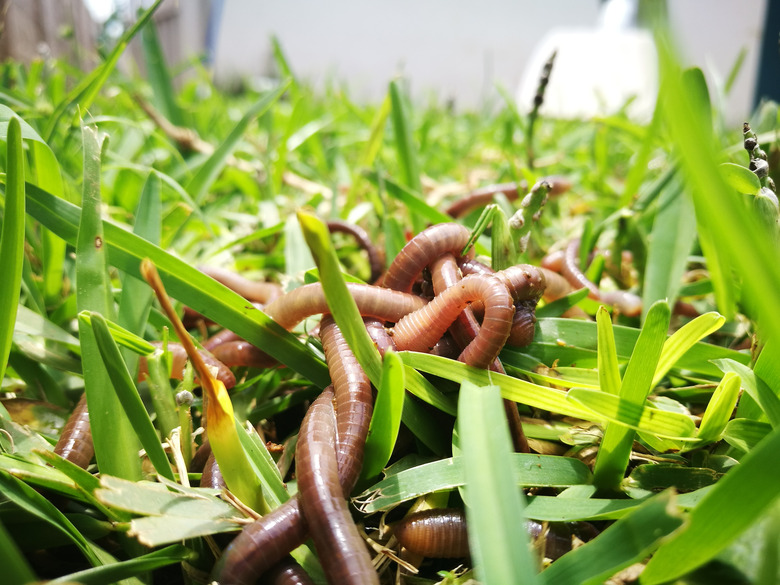Differences Between Earth Worms And Compost Worms
Worm composting – also called vermicomposting – uses specialized worm species to break down organic waste. Composting with worms is a continuous process that can be done indoors or outdoors, in either garden compost piles or specialized composting bins or barrels: it's considered easier, since you don't have to turn the compost material manually because the worms do it for you. Typically, red wiggler worms are used in vermicomposting bins. While there may only be a slight visual difference between red wigglers and earthworms, the differences between the two worm species make earthworms ill-suited for bin vermicomposting systems.
Red Wigglers vs Earthworms
Red Wigglers vs Earthworms
Visually, it can be difficult to determine whether you're looking at red wigglers vs earthworms in the dirt. Like all annelids, the body of the worms are divided into segments, and both earthworms and red wigglers are typically reddish in color. Earthworms are generally a reddish-brown, and range in size from as small as 1/4 inch in length to 6 inches or longer. The largest earthworm ever recorded was found in South Africa and measured 22 feet long. Red wiggler worms, in slight contrast, are typically between 2 to 3 inches long and have a reddish-purple color as well as a yellow tip at the tail. Some species of red wiggler worms also have stripes.
Ideal Worm Conditions
Ideal Worm Conditions
The red wiggler worm – also called the red worm, brandling worm, manure worm and tiger worm – is most commonly used for bin and barrel vermicomposting because it thrives in the warm conditions found in a compost bin. Red wigglers are adaptable, tolerating temperatures from 32 degrees Fahrenheit to 95 degrees Fahrenheit. They are also great breeders that feed on a range of organic waste and the microorganisms living in that material. Red wigglers aren't typically found in your backyard, however, and aren't well-suited for garden compost piles: earthworms on the other hand, sometimes confused for the range of smaller species commonly known as the "nightcrawler worm," are ideal for outdoor gardens and can often be found in your backyard and flower beds. Because they need moist soil to survive, however, they will burrow deep into the ground if the conditions are dry or cold.
Composting Worm Food
Composting Worm Food
Earthworms remove dead organic material from the surface of the soil and carry it underground. Earthworms will eat up to their body weight in food daily. Soil quality is improved through their castings – feces – which provides nutrients for plants. Red wigglers also improve the soil, but are more aggressive than earthworms. They will also eat up to their own weight in food daily, but red wigglers always remain near the surface of the soil where they feed on dead plant material. They speed up the composting process by eating a large quantity of dead organic material and leaving castings behind for living plants to feed on.
Vermicomposting Worm Concerns
Vermicomposting Worm Concerns
Because they reproduce more rapidly than earthworms and stay near the surface, red wigglers are more ideal for composting bins. Earthworms can kill themselves trying to burrow through the bottom of a worm bin because they are a burrowing worm, which means they prefer to stay well below the surface. In composting, this isn't ideal because the worms aren't gathering the surface material, and you may have to turn the compost to introduce them to new material.
Cite This Article
MLA
Miller, Renee. "Differences Between Earth Worms And Compost Worms" sciencing.com, https://www.sciencing.com/differences-between-earth-worms-and-compost-worms-12498654/. 20 September 2018.
APA
Miller, Renee. (2018, September 20). Differences Between Earth Worms And Compost Worms. sciencing.com. Retrieved from https://www.sciencing.com/differences-between-earth-worms-and-compost-worms-12498654/
Chicago
Miller, Renee. Differences Between Earth Worms And Compost Worms last modified March 24, 2022. https://www.sciencing.com/differences-between-earth-worms-and-compost-worms-12498654/
